The most recent Cedex report says October saw the largest proportion of renewables on record since data was made available.
Australia’s renewable energy market hit an all time high this October with 21.7 per cent of power in the national electricity market being sourced from renewables.
This is the highest percentage since the Australian Energy Market Operator made data available in 2005, according to a report from the Australian Institute and engineering consultants Pitt&Sherry.
The high level of renewable energy resulted in a drop in emissions from the national electricity market, approximately 0.8 per cent less that the previous year, bringing it back down levels of May 2014.
From the beginning of the year to October, 14.7 per cent of the national electricity market supply was renewable energy– this includes South Australia and the eastern states.
Hugh Saddler from Pitt&Sherry is the lead author of the report and stated that October had the largest share since 1982, a time that saw demand much lower and a large amount of hydropower was used.
“It further demonstrates the potential of a combination of renewable sources to produce very large amounts of power, which will help put downward pressure on future prices as replacement costs impact wholesale prices,” said Saddler.
There was a surprising lack of correlation between whole and historical retail prices shown in the report. While wholesale prices have remained roughly flat for the last two decades, retail prices have been rising sharply since 2007, almost doubling in that time.
Saddler said that although there has been lots of discussion on the effect coal plant closures will have on electricity prices, the data from the last 20 years shows wholesale electricity prices being effectively flat in real dollars.
Meaning, price increases were not being pushed further up by wholesales prices, instead by retailers and distribution networks.
“Those concerned about electricity prices for households and business should logically be focused on the distribution and retail side of the issue but, for some reason, we usually hear about production and wholesale concerns from politicians,” said Saddler.



